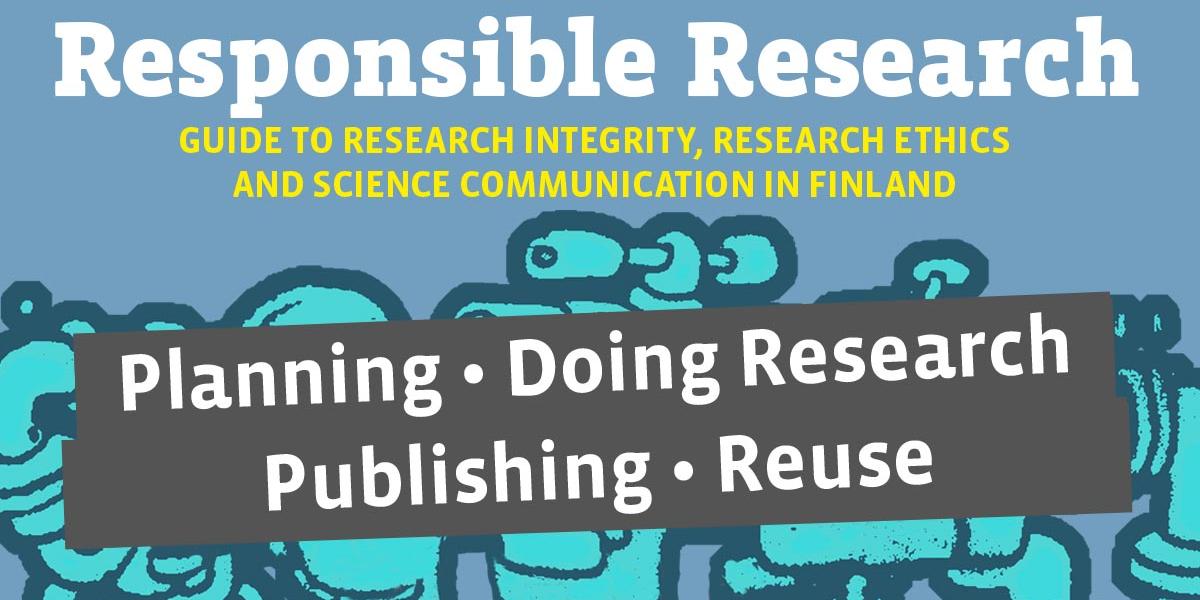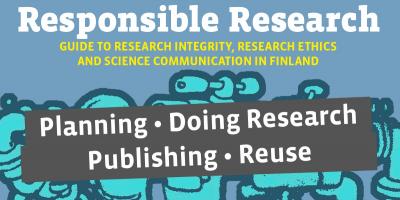
Publishing gives researchers academic merit, but authorship brings also responsibility for the content of the publication.
Practices concerning authorship vary between disciplines. It is important that research projects maintain an ongoing discussion early on about the requirements for authorship in order to prevent ambiguities, disagreements and misconduct.
In the context of research integrity, author is a person whose contribution to the production of a research article or another research publication is significant enough to merit their inclusion in the list of authors. Those listed as authors or editors can include the publication in their list of publications.
However, every type of participation in this work does not require the acknowledgement of authorship. In addition, authorship does not always require taking part in the actual writing of the publication. If the type of work does not merit inclusion in the list of authors, a person’s contribution can be described and acknowledged in the acknowledgements. If the contribution does not justify inclusion in the list of authors, a person may have copyright to certain parts of the publication, for example figures or illustrations.
What kind of contribution is enough for authorship?
Many guidelines on authorship recommend that the right to be included in the list of authors requires that a substantial contribution has been made to the study in question. Definitions of substantial contribution, however, vary depending on discipline.
In addition to the actual writing process, there are many types of contribution that should be acknowledged. Designing the research plan, compilation of research data and data analysis, development of materials or methods used in the study, acting as the editor of a publication, or creating figures to illustrate the research all qualify as contributions to the publication. How these activities are acknowledged in the publication must be discussed and agreed upon in the research project.
When a research group decides on the authorship of a publication, the principle they agree upon must be generally accepted within their discipline and all those involved must be informed of the decision.
When a research group decides on the authorship of a publication, the principle they agree upon must be generally accepted within their discipline and all those involved must be informed of the decision. Particularly in multidisciplinary and international projects it is important to be aware of the differences between disciplines and to work towards a solution well in advance.
The Finnish National Board on Research Integrity TENK does not comment on discipline-specific differences in determining what counts as a significant contribution. However, TENK recommends that research projects agree on these questions early on and in writing, when the project is still at the planning stage. The topic of what counts as a significant contribution should be brought up whenever new people join the research group or the situation changes in another way.
Authorship is not connected to employment contract
Even though it is largely possible to decide how authorship is defined and who can be included in a list of authors, it is not possible to waive the right to be recognised as an author in an employment contract or in other agreements. This is important not only with regard to a researcher’s professional merits, but also with regard to research integrity and the responsibility that authorship brings.
TENK has outlined in its statements that student position or employment contracts are irrelevant when assessing whether a person should be included as an author of a publication. Authorship depends solely on the person's scientific contribution regarding the information presented in the research.
How should authors be listed?
The order of the names on a list of authors is significant, but how the names are listed varies by discipline. Some disciplines emphasise the importance of the first author; in other disciplines, the last author is the most important. Often the researcher who did the majority of the work is named as the first author. The last person named may be the supervisor or the head of the research team. Some disciplines or fields of research follow the alphabetical order.
How the authors of a joint article are listed varies by discipline and field of research.
TENK recommends following established discipline-specific practices that are accepted in the research community. In addition, all the authors must know what order has been selected and accept this decision. Due to differences between disciplines, it is important to agree upon these questions in advance especially in multidisciplinary and international projects.
The authorship of a dissertation
The authorship questions of a dissertation must be agreed upon well in advance. If an article-based thesis consists of joint articles, the advisors’ statement or other report must specify the doctoral candidate’s contribution to the article and the respective research project. In the advisor agreement, the doctoral candidate and the advisor agree upon the principles of authorship to be followed in the article-based thesis and how the role of potential assistants or other contributors is taken into account.
The doctoral candidate always retains copyright to their doctoral thesis. This applies to authors of monographs as well as article-based theses. Further information can be found in the recommendations prepared by TENK and Universities Finland UNIFI on research integrity in the doctoral supervision and review process (pdf).
Authorship means responsibility over the content
Authorship recognises the work that people have put into a research project. As authors they are also responsible for the contents and results of the published research. Unless otherwise stated in the publication, the listed authors share responsibility for the entire publication.
Author roles and responsibilities
Sometimes the publication has been created by such an extensive or multidisciplinary group that it is unreasonable to require everyone to be responsible for every aspect of the research. One way to hold the listed authors accountable for their contribution only is to list the role of each author at the beginning of the article. If the authors are listed on the basis of their role, it is important that at least one author assumes responsibility for the entire publication. This author is called the guarantor.
The corresponding or contact author is the person who handles the interaction with the publisher. Their contact details are published with the article, and it is their responsibility to make sure that information moves freely between the publisher and the other authors. The use of this term varies between disciplines. The corresponding author may also act as the guarantor.
The work of an editor can consist of copy-editing as well as contributions to the scientific content and the substance of the publication. The authorship requirements for an editor, editor-in-chief, or member of the editorial board must be agreed upon on a case-to-case basis, possibly already at the start of the project. It must be clearly defined what kind of editorial input is mentioned for example in the acknowledgements instead.
All types of authorship are not in line with responsible conduct of research.
There are types of authorship that aren't in line with responsible conduct of research. Ghost author means an anonymous author who has agreed to write on behalf of someone else. Sometimes this term is used of a person whose research contribution should merit their inclusion as an author, but whose name is missing from the list. Neither practice is in accordance with the responsible conduct of research.
Honorary, guest or gift authorship refers to a practice where authorship is given as a gift to someone who hasn’t contributed to the research with the kind of input that would justify their authorship. Sometimes a gift authorship is given in hopes of a reciprocal gift, but sometimes the recipient doesn’t even know that their name has been used. Mostly this is done to increase the scientific value of the publication. Giving authorship as a gift is not responsible conduct of research.
Medical writer refers to the technical editor of the manuscript especially in medical research. Usually the medical writer has not participated in the research itself, and they are not mentioned as an author.
Guidelines and recommendations on authorship
The Finnish National Board on Research Integrity TENK has published the recommendations Agreeing on authorship. Recommendation for research publications. Finnish National Board on Research Integrity recommendations 2018 (pdf), which, in addition to the topics covered in this article, include tools and methods for discussing and agreeing upon authorship.
All Finnish universities and almost all Finnish universities of applied sciences are committed to the guidelines Responsible conduct of research and procedures for handling allegations of misconduct in Finland (RCR guidelines) (pdf), produced by the Finnish National Board on Research Integrity TENK.
The RCR guidelines comment on authorship as follows: “Before beginning the research or recruiting the researchers, all parties within the research project or team (the employer, the principal investigator, and the team members) agree on the researchers’ rights, responsibilities, and obligations, principles concerning authorship, and questions concerning archiving and accessing the data.”
According to the RCR guidelines, violations of the responsible conduct of research include “denigrating the role of other researchers in publications, such as neglecting to mention them, and referring to earlier research results inadequately or inappropriately” and “manipulating authorship, for example, by including in the list of authors persons who have not participated in the research, or by taking credit for work produced by what is referred to as ghost authors”.
Many publishers have their own authorship guidelines. A widely known example is the guidelines of the International Committee of Medical Journals Editors (ICMJE), the so-called Vancouver guidelines. The Vancouver guidelines recommend authorship to be based on the following four criteria:
- substantial contributions to the conception or design of the work; or the acquisition, analysis, or interpretation of data for the work
- drafting the work or revising it critically for important intellectual content
- final approval of the version to be published
- agreement to be accountable for all aspects of the work in ensuring that questions related to the accuracy or integrity of any part of the work are appropriately investigated and resolved.
The purpose of the ICMJE guidelines is not to exclude possible authors. The guidelines state that anyone who has participated in the development and design of the research or the collection and analysis of data and material must be given the opportunity to participate in the planning, reviewing and final approval of a manuscript written on the basis of the research, and thus the possibility to be mentioned in the list of authors.
In spring 2017, the All European Academies (ALLEA) published a revised edition of The European Code of Conduct for Research Integrity. The guidelines comment on authorship as follows:
“All authors are fully responsible for the content of a publication, unless otherwise specified.
All authors agree on the sequence of authorship, acknowledging that authorship itself is based on a significant contribution to the design of the research, relevant data collection, or the analysis or interpretation of the results.
Authors acknowledge important work and intellectual contributions of others, including collaborators, assistants, and funders, who have influenced the reported research in appropriate form, and cite related work correctly.
All authors disclose any conflicts of interest and financial or other types of support for the research or for the publication of its results.”
More information:
Agreeing on authorship. Recommendation for research publications 2018: www.tenk.fi/sites/tenk.fi/files/TENK_suositus_tekijyys.pdf
Supervision of doctoral dissertations and their review process in Finland with a special emphasis on research integrity. Recommendations to universities by the Finnish Advisory Board on Research Integrity and Universities Finland UNIFI (PDF) (2016, English edition 2017): https://www.tenk.fi/sites/tenk.fi/files/TENK_UNIFI_recommendations_supervision_of_doctoral_dissertations.pdf
You might also be interested in
Tämä teos on lisensoitu Creative Commons Nimeä 4.0 Kansainvälinen -lisenssillä. Detta verk är licensierat under en Creative Commons Erkännande 4.0 Licens. This work is licensed under a Creative Commons Attribution 4.0 International license.

